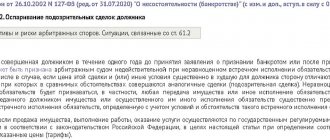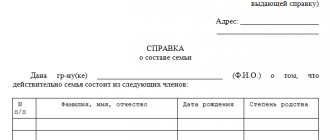Who is the defendant - term
The defendant is a participant in the lawsuit, involved as an alleged violator of the plaintiff's rights. The defendant can be any person who has judicial procedural capacity, which is recognized equally for all citizens (individuals) and enterprises (legal entities).
Who is a co-defendant in court?
A co-defendant is a citizen who is involved in the proceedings along with the main defendant. All citizens who are co-defendants have the same rights and obligations, as specified in Article 35 of the Code of Civil Procedure of the Russian Federation.
For reference: Who is the plaintiff?
According to the legal community, a defendant is a person with civil (arbitration) procedural legal capacity, who is involved in the process on the initiative or with the consent of the plaintiff (procedural plaintiff) to protect his interests that are different from the plaintiff, who allegedly violates or challenges a subjective substantive right or legitimate interest of the plaintiff.
We believe it is important to note that the plaintiff and defendant acquire the corresponding procedural status from the moment a statement of claim is filed with the jurisdictional body, and not from the moment the proceedings are initiated. As I.A. quite rightly noted. Zheruolis:
“The emergence of a civil process is determined not by the court’s acceptance of a claim or other statement, but by the filing of such a statement by a person. Filing an application to the court is a procedural action, i.e. a legal fact by virtue of which a procedural legal relationship arises between the court and the applicant, and at the same time is a procedural action that, together with other procedural actions, constitutes the content of the arising procedural legal relationship.”
In general, the term “defendant” is applicable to civil, administrative, criminal or arbitration disputes.
In criminal proceedings, there is the concept of “accused” - a person who is accused of a criminal offense. During the investigation, he is called a person under investigation, during a trial - a defendant, and after a guilty verdict is pronounced - a convicted person. At the same time, other persons may also be defendants in the case.
For example, if an internal affairs officer exceeds his authority by committing a criminal offense, the plaintiff may seek compensation for moral damages from the Ministry of Internal Affairs. In this case, the employee will be the accused in a criminal case, and the Ministry of Internal Affairs will be the defendant in a civil case; accordingly, the plaintiff must file both a criminal and a civil claim.
The defendant’s lack of any legal relationship with the plaintiff cannot be a sufficient basis for refusing to accept the statement of claim and consider the case in court.
What should a defendant do in court?
In accordance with the legislation of the Russian Federation, the defendant has the right:
- submit written objections to the claim (written explanations from the defendant, response to the claim, petitions, etc.);
- demand the calling of witnesses (with justification for the need for their participation);
- participate in court personally or through a representative;
- admit the claim in full or in part;
- get acquainted with the case materials (including with the help of a special
Who should send the statement of claim to the defendant, the court or the plaintiff?
According to paragraph 6 of Art. 132 of the Code of Civil Procedure of the Russian Federation, the plaintiff must independently send to other participants in the process a copy of the claim and other documents, and provide confirmation of their sending to the court. The statement of claim must be accompanied by a notice of delivery or other documents confirming the sending to other persons participating in the case, copies of the statement of claim and documents attached to it, which other persons participating in the case do not have.
For reference: Administrative defendant.
Who is the defendant - the founder, the editor-in-chief or the editorial board?
In accordance with Part 1 of Art. 44 of the Constitution of the Russian Federation everyone is guaranteed freedom of literary, artistic, scientific, technical and other types of creativity. Intellectual property is protected by law.
Suppose a certain citizen Petrov, having seen his article in a newspaper, supplemented and signed by another author, wanted to restore justice and his rights. But, not knowing the law to which one should turn in this situation, much less the proper defendant, I did not dare to write a statement of claim.
Turning to part four of the Civil Code of the Russian Federation, which is entirely devoted to the right to intellectual activity and means of individualization, you can find out what is and what is not the object of copyright (Article 1259 of the Civil Code of the Russian Federation). Without the consent of the author of the work, it is prohibited to either use or change the results of intellectual activity. The only thing that is not clear is who should be considered the defendant in this case: the founder, the editor-in-chief or the editorial office of the newspaper. The legislator has highlighted the legal regulation of relations related to the media in a separate Law “On the Media”.
In accordance with Art. 56 of this Law “The founders, editorial boards, publishers, distributors, government bodies, organizations, institutions, enterprises and public associations, officials, journalists, authors of disseminated messages and materials are responsible for violations of the legislation of the Russian Federation on the media.” Based on this, it turns out that in our situation the founder and the editorial board have equal responsibility. But according to the Law “On the Mass Media”, the editorial office carries out its activities regardless of the founder. The founder has no right to interfere in its activities. This raises doubts about the responsibility of the founder. The responsibility of the editor-in-chief is included in Article 19 of this Law, which explains the status of the editorial office: “The editorial office is headed by the editor-in-chief. He represents the editorial office in relations with the founder, publisher, distributor, citizens, citizens' associations, enterprises, institutions, organizations, government bodies, as well as in court. He is responsible for fulfilling the requirements for the activities of the mass media by this Law and other legislative acts of the Russian Federation.” And from this, in general, one might think that guilt is envisaged only in the actions of the editor-in-chief. Further, in a completely different article, it is written that the editors are obliged to respect the rights to the works used, including copyrights, publishing rights, and other intellectual property rights (Article 42 of the Law). From all of the above, we nevertheless found out that both the editorial office and the editor-in-chief will be co-defendants in court.
Will the founder be held liable for violating the copyright of citizen Petrov? It is necessary to distinguish between the founder of a media outlet and the founder of an editorial office when it is registered as a legal entity or an individual. The editorial office of the media carries out its activities related to the periodic dissemination of mass information, i.e. concerns only the creative side. If the editorial office is registered as an individual or legal entity, then the founder bears the rights and obligations inherent in the founder of the organization, provided for by civil law.
The Resolution of the Plenum of the Supreme Court of the Russian Federation dated June 15, 2010 No. 16 “On the practice of application by courts of the Law of the Russian Federation “On the Mass Media” states that in the case when the editorial office of a mass media is neither an individual nor a legal entity, participation The founder of the given mass media may be involved in the case.
Also, the founder may be the proper defendant in accordance with Part 2 of Art. 18 of the Law, which states that the founder has the right to oblige the editorial office to publish a message or material on his behalf (statement of the founder). And if there is no indication that the message or material belongs to the founder, so does the editorial office of the mass media (Resolution of the Plenum of the Supreme Court of the Russian Federation dated June 15, 2010 No. 16).
Thus, it is proposed to streamline the provisions of the Law “On the Mass Media”, move everything that concerns the liability of participants in regulated legal relations to the chapter on liability and explain it in more detail.
Improper defendant
In judicial practice, there are cases when a person is brought in as a defendant who has nothing to do with the violated right of the plaintiff and cannot act as a defendant (Resolution of the Arbitration Court of the Central District of April 13, 2016 No. F10-475/2016 in case No. A08- 5286/2014).
The parties to a civil proceeding are the subjects of a controversial material legal relationship who have a substantive and procedural interest; as a rule, the defendant in a case in a lawsuit appears by indicating him by the plaintiff when filing a statement of claim in court. The plaintiff always points to the person who allegedly violated his right. However, there are cases when the plaintiff mistakenly names a person as a defendant in the statement of claim. In this case, the person against whom the substantive claims were brought by the plaintiff erroneously will be an improper defendant. Errors can be caused by ignorance or misinterpretation of the law, as well as a lack of understanding of the actual circumstances of the conflict.
To be a proper party in a particular case, it is necessary to be the subject of a controversial material legal relationship. For the defendant, this means having a certain substantive legal connection that is obligatory towards the plaintiff, arising from the disputed substantive legal relationship.
Thus, an improper defendant is a person in respect of whom the plaintiff makes an erroneous conclusion about his involvement in controversial substantive legal relations and his controversial responsibilities.
Replacing an inappropriate defendant
The defendant in civil, arbitration and administrative proceedings may be improper, and the norms of procedural legislation provide for a certain procedure for its replacement (Article 41 of the Code of Civil Procedure of the Russian Federation, Article 47 of the Arbitration Procedure Code of the Russian Federation, Article 43 of the Code of Arbitration Procedures of the Russian Federation).
When accepting a statement of claim, the judge does not always have the opportunity to determine whether the defendant is proper or not. The court cannot refuse the plaintiff to accept the statement of claim or return the claim even if it is discovered that the claim was filed against an improper defendant, since this is not provided for in Art. Art. 134 and 135 Code of Civil Procedure of the Russian Federation, Art. 149 Arbitration Procedure Code of the Russian Federation, Art. 129 CAS RF.
The civil procedure legislation does not provide for a solution to the issue of replacing an improper defendant at the initiative of the court at the stage of accepting an application; this issue is resolved only during the preparation of the case or during its trial in the court of first instance and only at the request of the plaintiff or with his consent (Appeal ruling of the Moscow City court dated March 10, 2016 in case No. 33-8473/2016, Appeal ruling of the Voronezh Regional Court dated May 15, 2014 No. 33-2548).
The issue of replacing an improper defendant with a proper one in the arbitration process can be resolved during the consideration of the case on the merits, including at the stage of preparing the case for trial, and not at the stage of accepting the statement of claim for proceedings, therefore the issue of determining the defendant is not a basis for returning the statement of claim (Resolution of the Third Arbitration Court of Appeal dated October 9, 2012 in case No. A33-9809/2012).
Exclusion from defendants
It should be noted that the procedure for “exclusion from the list of defendants” is not provided for by either civil procedural, administrative, or arbitration procedural laws. In practice, this implies that when filing a claim against several defendants, the plaintiff, abandoning the claim against one or more of the defendants (Article 49 of the Arbitration Procedure Code of the Russian Federation, Article 173 of the Code of Civil Procedure of the Russian Federation), actually “excludes” such a defendant and does not replace him with the proper one the defendant, because he was previously brought in by the plaintiff as a co-defendant.
Defendant's liability
The defendant is not criminally liable for misleading the court. Responsibility for this can be imputed to the defendant only under certain articles of the Code of Civil Procedure of the Russian Federation, the Civil Code (Civil Code) of the Russian Federation and the Arbitration Procedural Code (APC) of the Russian Federation.
| Method of misleading the court | Legislative act | Measure of responsibility |
| abuse of process | Art. 111 Arbitration Procedure Code of the Russian Federation | imposing on the perpetrator all legal costs of procedural actions |
| Art. 99 Code of Civil Procedure of the Russian Federation | payment of compensation to the opposing party for lost time | |
| misrepresentation | Art. 151 Civil Code of the Russian Federation | payment of monetary compensation for causing moral damage |
| Art. 1064 Civil Code of the Russian Federation | payment of monetary compensation for material damage, if any was caused to the victim as a result of deception of the court by the defendant |
Responsibilities
In accordance with the legislation of the Russian Federation, the defendant is obliged to:
- write written objections to the claim,
- while in a court session, participate in the process only with the permission of the judge (chairman of the court session),
- maintain court discipline,
- do not abuse rights,
- comply with court requirements,
- promote fair consideration of the case,
- perform other duties prescribed by the court and law.
Defendant: rights and obligations in court
Rights vested in the defendant in court:
- Submit written objections to the claim.
- Request to call a witness to court.
- Participate through a bearer in court or in person.
- Has the right to partially admit the claim or admit it in full.
- Make extracts from the case materials and become fully familiar with the case materials.
- It is justified to challenge translators, experts, and judges.
- Persons involved in the case should ask questions.
- Provide oral explanations to the court regarding the case.
- Object to the arguments of persons who participate in the court case, object to motions and present your own arguments regarding questions during the course of the case.
- File a complaint (private, appeal, cassation) against court decisions or decisions.
- Ask the court to conduct examinations.
- To petition regarding evidence from other persons for the recognition of evidence, to consider it irrelevant or inadmissible.
- Have the right to file a counterclaim if:
- the counterclaim will be sent to offset the original claim;
- excludes the satisfaction of the original claim in full or in part;
- It is his claim that can lead to faster and more correct consideration, since it has a connection between the original claim.
- The plaintiff shall enjoy all rights and obligations at the time of filing a counterclaim.
- Before the court, petition for the involvement of co-defendants.
- If there are grounds, then demand the transfer of the consideration of the case from the court.
- If, in the event of signing a settlement agreement that will more closely meet the defendant’s requirements, then you will have the opportunity to apply for payment of part of the costs for experts and a representative.
- Demand reimbursement of legal costs in full or in part if the claim is upheld by the court.
The defendant has not only obligations, but also rights
Responsibilities of the defendant:
- Write an objection to the claim in writing.
- Only with the permission of the judge to participate in the process while in the courtroom.
- Maintain court discipline.
- Do not abuse your rights.
- Comply with requirements from the court.
- To contribute only to a fair consideration of this case.
- To fulfill the duties prescribed by the court.
These responsibilities and rights should not be neglected. And the fact that the submission of a response to the claim is both the right and the obligations of the defendant entails, in the event of non-compliance with this concept on the part of the duties of the court, to believe more on the side of the plaintiff.








